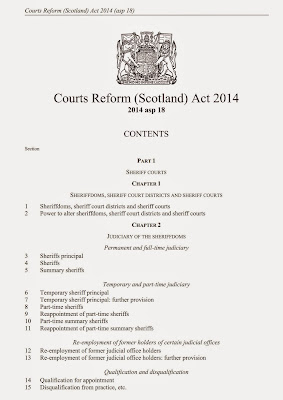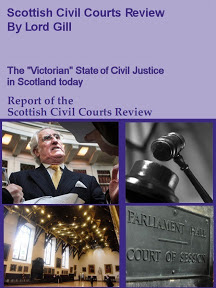 New court reforms claim justice will go faster. SCOTLAND’s embattled top judge, Lord President Lord Brian Gill has welcomed the implementation of the Courts Reform (Scotland) Act 2014 – legislation aimed at reforming Scotland’s hugely expensive and out of touch civil justice system which features watered down proposals Lord Gill originally made over five years ago in 2009.
New court reforms claim justice will go faster. SCOTLAND’s embattled top judge, Lord President Lord Brian Gill has welcomed the implementation of the Courts Reform (Scotland) Act 2014 – legislation aimed at reforming Scotland’s hugely expensive and out of touch civil justice system which features watered down proposals Lord Gill originally made over five years ago in 2009.
Among the proposed changes will see an increase the value limit of cases heard in the sheriff court from £5,000 to £100,000, and the swelling of Scotland’s already burgeoning judicial ranks with the introduction of summary sheriffs to deal with some types of criminal and civil cases in the sheriff courts and the establishing of a Sheriff Appeal Court and a specialist personal injury court of national jurisdiction within the sheriff court.
The legislative reforms – mostly designed to benefit the legal profession instead of fee paying clients & the wider public, come after Lord Gill and his team conducted a two year review of Scots Civil justice which began in 2007. Two years later in 2009, Gill – then Lord Justice Clerk – published his report and rounded on the stagnation of justice, branding Scotland’s courts as “Victorian” and unfit for purpose.
Gill (72) – who is fighting a bitter two year battle with the Scottish Parliament in an attempt to avoid members of the judiciary having to declare their interests such as sizeable, secret wealth, multi million pound property portfolios, links to big business, criminal records and offshore tax avoidance – issued a statement claiming the announced reforms, which only came about after an additional review of Gill’s original recommendations “will provide Scotland with a civil justice system fit for the 21st century”.
 Courts Reform (Scotland) Act 2014. The ‘reforms’ – which claim to speed up justice also target non lawyer and much cheaper McKenzie Friends, otherwise known as “Lay Representatives” in Scotland’s courts. The move, seen as a protectionist measure by the Scottish Government & judiciary to discourage people from using lay representatives, makes a MacKenzie Friend jointly liable with the person they are representing for all costs in a legal case if they lose.
Courts Reform (Scotland) Act 2014. The ‘reforms’ – which claim to speed up justice also target non lawyer and much cheaper McKenzie Friends, otherwise known as “Lay Representatives” in Scotland’s courts. The move, seen as a protectionist measure by the Scottish Government & judiciary to discourage people from using lay representatives, makes a MacKenzie Friend jointly liable with the person they are representing for all costs in a legal case if they lose.
Among other restrictions & sanctions placed on lay representatives, which do not apply to members of the legal profession, Section 98 0f the act states: Lay representation: supplementary provision (2) Provision under subsection (1) may include, in particular, provision— (g) enabling the court, in awarding expenses against a non-natural person in any case to find a lay representative jointly and severally liable for the expenses.
The Lord President also confirmed his intention to appoint Sheriff Principal Mhairi Stephen as the President and Sheriff Principal Craig Scott as Vice President of the new Sheriff Appeal Court.
Lord Gill said: “These reforms will safeguard the integrity of Scots law by creating an efficient court structure. Every case will be heard by the appropriate court. The system will be accessible and cost effective for the litigant. My colleagues and I in the Review Team are particularly grateful to the Scottish Parliament for having passed into law almost all of our recommendations.”
Lord Gill added: “The process of implementation will now begin. I intend to appoint Sheriff Principal Stephen as the President, and Sheriff Principal Scott as Vice President, when the court comes into being.”
Justice Secretary, Kenny MacAskill who has remained a steadfast advocate of the legal profession, said: “I am delighted that this Government’s Court Reform Bill has become enshrined in law and has today received Royal Assent.Our courts have remained relatively unchanged for decades but this new legislation will bring about the most important change for Scottish courts for more than a generation. This is a hugely important step forward in making Scotland’s civil justice system more accessible, affordable and efficient for those people who need to resolve civil disputes.”
MacAskill continued: “We have listened to and accepted concerns from some stakeholders and made amendments to ensure that people get access to the most appropriate legal representation in their cases. I am confident that the reformed courts structure, including the new national specialist personal injury court, will ensure that cases can be raised and dealt with quickly and effectively and there is easier and more affordable access to justice.We look forward to working with our partners across the justice system to implement these reforms.”
However, despite claims the reforms will make justice faster, legal insiders and observers to Scotland’s courts expect little to change in what are the most adversarial, most inaccessible and most expensive courts & legal system in the entire European Union.
Civil Courts Review : Scots Justice still “Victorian” years after judge called for reforms:
The Scottish Civil Courts Review of 2009 authored by then Lord Justice Clerk, now Lord President Lord Brian Gill, castigated Scotland’s Civil Justice System as being Victorian, costly, and unfit for purpose, yet years on from the review, little of the proposed reforms have been implemented due to pressure from vested interests in the legal world, and a lack of political will to deliver access to justice to all Scots.
The Civil Courts Review can be viewed online here : Scottish Civil Courts Review Synopsis, Scottish Civil Courts Review Vol1 Chapters 1-9 & Scottish Civil Courts Review Vol2 Chapters 10-15
Gill, giving a speech to the Law Society of Scotland’s 60 year anniversary conference several years ago, reproduced in full here said : “The civil justice system in Scotland is a Victorian model that had survived by means of periodic piecemeal reforms. But in substance its structure and procedures are those of a century and a half ago. It is failing the litigant and it is failing society.
“It is essential that we should have a system that has disputes resolved at a judicial level that is appropriate to their degree of importance and that disputes should be dealt with expeditiously and efficiently and without unnecessary or unreasonable cost. That means that the judicial structure should be based on a proper hierarchy of courts and that the procedures should be appropriate to the nature and the importance of the case, in terms of time and cost. Scottish civil justice fails on all of these counts. Its delays are notorious. It costs deter litigants whose claims may be well-founded. Its procedures cause frustration and obstruct rather than facilitate the achievement of justice.”
Previous articles on the Civil Courts Review and reforms of Scotland’s antiquated civil justice system can be found on Diary of Injustice here: Scottish Civil Courts Review.


























































